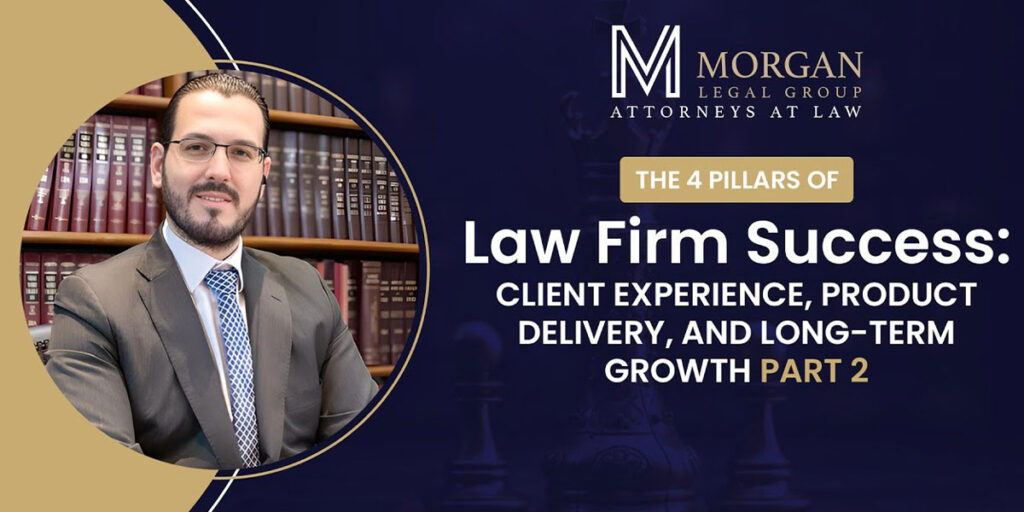A Blueprint for Success: Insights from Russel Morgan’s Podcast
What separates a competent legal practitioner from a truly successful legal entrepreneur? In a landscape saturated with talent, the answer extends far beyond the courtroom or the law library. It lies in a relentless drive, a strategic business mindset, and an unwavering commitment to excellence in every facet of the practice. To explore this dynamic intersection of law and entrepreneurship, we invite you into the world of the ‘Obsessed with Success’ podcast, hosted by Russel Morgan, founder of Morgan Legal Group, and Kevin Rosenquist.
The ‘Obsessed with Success’ podcast is more than just a series of interviews; it is a masterclass for ambitious professionals. It delves into the personal stories, the bold actions, and the strategic choices that forge today’s leading legal careers. In a recent, candid episode, Russel Morgan pulled back the curtain on his own journey, outlining the foundational pillars that have supported the growth of his firm from a solo practice into a cornerstone of the New York City legal community. This guide will distill the essential wisdom from that conversation, providing a roadmap for any lawyer or professional looking to build not just a practice, but a thriving enterprise.
Pillar 1: The People – Building a Championship Team Through Rigorous Hiring
The journey from a solo practitioner to a scalable business begins with the first hire. As Russel Morgan explained, this transition, which began after the first year of his practice, is one of the most challenging and critical phases of growth. The success of your firm and your ability to delegate effectively are entirely dependent on the quality of your team. However, finding and retaining quality employees is a significant hurdle. The key, learned through years of experience, is a multi-layered and meticulous hiring process that prioritizes verification over initial impressions.
A common and costly mistake is taking a candidate at their word during an interview. The reality is that resumes can be polished and interview answers can be rehearsed. A truly effective hiring process must go deeper, testing for reliability, competence, and cultural fit through practical application. This involves multiple rounds of screening and trial periods before a permanent offer is made, ensuring that every new team member is a true asset who will uphold the firm’s high standards in complex areas like probate and estate administration.
A Strategic Approach to Screening and Compensation
The philosophy behind a successful hiring process is built on two core tenets: incremental evaluation and competitive compensation. You cannot and should not micromanage your team. The goal is to hire reliable, self-sufficient individuals. To find them, Russel Morgan advocates for a system of assigning small, incremental tasks to potential hires during the screening process. This approach allows you to assess their reliability, communication skills, and quality of work in a real-world context without a significant upfront commitment.
Once you find these quality employees, the next challenge is to keep them. High turnover is a silent killer of productivity and morale. The cost of recruiting, hiring, and retraining a new employee far outweighs the cost of investing in your current team. This means paying your staff well and, just as importantly, creating a positive and supportive work environment. When your team members feel valued, fairly compensated, and enjoy their work, they become invested in the firm’s success. This creates the loyal, high-performing workforce that is essential for effective delegation and sustainable growth. For those interested in joining a team with this philosophy, you can always get in touch.
The Indispensable Role of Infrastructure and Training
Even the most talented employees cannot succeed without the proper framework. A strong infrastructure is the backbone of a scalable law practice. This includes:
- Proper Training: Every new hire must be thoroughly trained on the firm’s procedures and standards, ensuring consistency in the quality of work.
- Clear Standard Operating Procedures (SOPs): Detailed SOPs for every recurring task, from client intake to filing court documents, eliminate guesswork and ensure that processes are followed correctly every time.
- The Right Technology: Investing in modern case management and communication tools empowers your team to work efficiently and collaboratively.
This commitment to infrastructure is what allows a firm’s leader to confidently delegate complex tasks, such as the preparation of documents for a guardianship proceeding, knowing that the systems are in place to ensure quality and accuracy. It is the key to transitioning from a lawyer who owns a job to a business owner who runs a firm.
Pillar 2: The Mindset – Evolving from Practitioner to Business Owner
One of the biggest obstacles to growth, particularly for solo practitioners and professionals, is a deeply ingrained but problematic mindset: the belief that “we know best.” This traditional perspective, where the professional is seen as the sole gatekeeper of knowledge, is a relic of a bygone era. As Russel Morgan powerfully articulated on the podcast, this mindset is a primary contributor to the high failure rate of small firms and businesses within their first two years. In today’s information-rich world, the dynamic has fundamentally shifted.
Clients are no longer passive recipients of information. They have access to a vast and ever-growing ocean of knowledge at their fingertips. They research their own legal issues, read articles, and watch videos before they ever pick up the phone to call an attorney. The successful modern professional recognizes and embraces this shift. They understand that their role is not just to provide answers, but to provide clarity, context, and expert guidance. This requires a profound mindset shift: you must stop thinking like just a lawyer and start thinking like a business owner who is in the business of providing legal services.
Treating Your Practice as a Business: The Content Imperative
What does it mean to treat your practice as a business in this new paradigm? It means you must actively demonstrate your value and build trust with your potential clients long before they ever sign a retainer agreement. The most effective way to do this is by providing free, high-quality, and valuable content through every available channel.
This content strategy serves two critical functions:
- It Establishes Authority: By consistently publishing insightful articles on topics like wills and trusts or creating videos that demystify the probate process, you position yourself as a leading expert in your field. You are not just telling people you are an authority; you are proving it.
- It Keeps You Visible: In a crowded marketplace, visibility is survival. A steady stream of content keeps you and your firm top-of-mind for potential clients and referral sources.
This approach transforms your marketing from a sales pitch into an educational service. You are building a relationship with your community by empowering them with knowledge, a strategy that is both ethical and incredibly effective for long-term growth.
Pillar 3: The Brand – Building Authority Through Public Exposure
Building on the business-first mindset, the third pillar of success is the intentional and relentless construction of your brand through public exposure. As Russel Morgan noted, the most successful entrepreneurs of our time—figures like Gary Vee, Elon Musk, and Donald Trump—have one thing in common: they are not hidden away in an office. They are constantly out in the public eye, building their personal and corporate brands through every available medium.
In today’s world, the tools to build a brand are more accessible than ever. The instantaneous and often free access to information allows any professional to build a powerful social media presence and engage directly with their audience. This strategy is no longer optional; it is a core component of modern business development. It is a low-cost, high-impact way to establish authority, build a community, and attract the clients you want to serve. For more insights on building a successful business, you can explore resources from platforms like Forbes Entrepreneurs.
The Role of Media in Forging Credibility and Fueling Growth
Building a powerful brand requires a proactive, multi-channel approach. You cannot simply wait for opportunities to fall into your lap; you must create them. This involves a consistent and dedicated effort in areas such as:
- Public Speaking: Offering to speak at community centers, professional organizations, or local events on topics related to your expertise, such as elder law, establishes you as a local authority and puts you directly in front of potential clients.
- Podcasting and Guest Appearances: Hosting your own podcast or being a guest on others allows you to share your knowledge with a wider audience in a personal and engaging format.
- Media Write-ups and Contributions: Actively seeking opportunities to be quoted as an expert in news articles or to contribute articles to publications builds immense third-party credibility.
While major media exposure, such as an appearance on a network like MSNBC, can be incredibly valuable for credibility, it should be seen as one component of a broader, more diversified strategy. Every piece of exposure, no matter how small, contributes to the overall strength of your brand. The key is to be consistent and to recognize that the market is always changing, so relying on a single method for building authority is a risky proposition.
Paid vs. Earned Media: A Strategic Balance
It is important to understand the difference between paid and earned media. Paid options, like Google ads, can provide an immediate but temporary boost in visibility. You are essentially renting space. The moment you stop paying, your visibility disappears. While this can be a useful tool for short-term lead generation, it does not build lasting authority.
In contrast, investing your time in creating long-term content—blog posts, videos, articles—is a form of “earned” media. This content lives on, continuing to attract an audience and build your authority for years to come without any continuous spending. A well-written article on a complex topic like guardianship litigation can generate leads for your firm for a decade or more. The most successful branding strategies strike a wise balance between these two approaches, using paid ads for immediate needs while relentlessly investing in the long-term asset of content creation.
Pillar 4: The Experience – Making Client Service a Cornerstone of Success
You can have the best team, the right mindset, and a powerful brand, but if your client experience is poor, your business will ultimately fail. The fourth essential pillar of success, as outlined by Russel Morgan, is an obsessive focus on the client experience. This means going beyond simply delivering a competent legal service. It requires a commitment to exceptional communication, a systematic approach to feedback, and a culture of continuous improvement in every client interaction.
In a service-based business, the client’s perception is their reality. From the very first phone call to the final closing of their case, every touchpoint matters. It is essential to have systems in place that ensure clients feel heard, valued, and respected, rather than feeling like they are just another case number on a file. This commitment to client success must be woven into the very fabric of the firm’s operations. This commitment is central to the mission of Morgan Legal Group and is a key reason for its continued growth and positive reputation.
A System for Communication and Feedback
Effective communication must be a core, systemized part of your practice. This begins with the initial client intake and must be maintained throughout the entire lifecycle of a case. It means providing regular, proactive updates, promptly returning phone calls and emails, and explaining complex legal concepts in a way that the client can understand. When clients are left in the dark, they become anxious and dissatisfied, even if their legal case is progressing perfectly.
Equally important is the implementation of a system to actively gather client feedback. You cannot improve what you do not measure. This involves systematically asking clients about their experience, both during and after their engagement with the firm. Both positive and negative feedback are incredibly valuable. Positive feedback tells you what you are doing right and can be used for testimonials and marketing. Negative feedback, while sometimes difficult to hear, is even more valuable. It is a gift that shines a bright light on the specific areas of your process that need improvement.
Turning Feedback into Action
Gathering feedback is useless if you do not act on it. A commitment to client experience requires having the infrastructure to address issues as they arise. At Morgan Legal Group, this is handled by a dedicated client relations department and a management team focused on client success. When negative feedback is received, it is not dismissed; it is analyzed to identify the root cause of the problem. Was it a communication breakdown? A procedural issue? A problem with a specific staff member? By identifying these issues, the firm can make concrete changes to its training and procedures to ensure the problem does not happen again. This iterative process of feedback and improvement is what transforms a good firm into a great one.
The Power of the Human Touch in a Digital Age
Delivering a superior client experience often comes down to simple, human actions. An extra phone call just to check in, a quick email to acknowledge a client’s concern, or taking a few extra minutes to explain a complex document can make all the difference. These small acts of empathy and attention are what distinguish your firm from competitors and make clients feel truly cared for.
In today’s society, the expectation for high-quality service is greater than ever, and the tolerance for poor experiences is incredibly low. While artificial intelligence and automation are valuable tools for improving efficiency, the human touch remains absolutely crucial in client communication. An over-reliance on automated responses can lead to client frustration and a feeling of being devalued.
Conclusion: Your Roadmap to Success
The candid insights shared by Russel Morgan on the ‘Obsessed with Success’ podcast provide more than just business advice; they offer a comprehensive and actionable roadmap for any lawyer or professional with entrepreneurial ambitions. The five pillars—a great team, a business mindset, a powerful brand, an exceptional client experience, and an unwavering commitment to the quality of your work—are not independent strategies but an integrated system for building a thriving and sustainable enterprise.
For legal professionals in particular, these lessons are a call to action to evolve beyond the traditional role of a practitioner and to embrace the role of a business leader. We encourage you to use this advice as a guide for your own career, revisiting these principles as you navigate the challenges and opportunities of building your own practice.
To hear more in-depth conversations about the intersection of law and entrepreneurship, we invite you to subscribe to the ‘Obsessed with Success’ podcast. Please leave a review and share this episode with anyone you know who is on the journey of building their own business. And, if you are in need of expert legal services built on these very principles of excellence, do not hesitate to contact Morgan Legal Group today.







